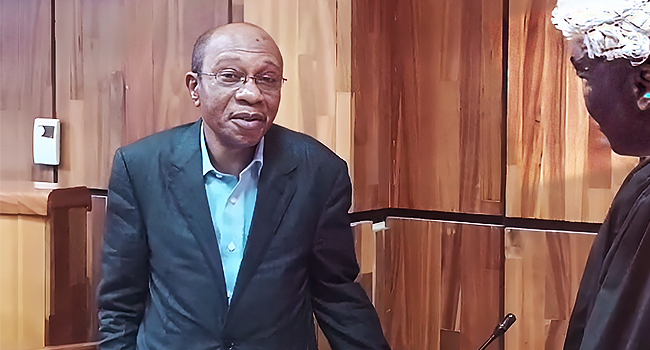A former Deputy Governor of the Central Bank of Nigeria (CBN), Edward Adamu, testified on Wednesday at the Federal Capital Territory High Court in Abuja that Godwin Emefiele, the former Governor of the Bank, did not adhere to the established procedures for the redesign of certain Nigerian currency notes.
During his examination by Rotimi Oyedepo, Counsel for the Economic and Financial Crimes Commission (EFCC), Adamu, who served as Principal Witness 4, stated that the Naira notes redesign initiated by former President Muhammadu Buhari and currently in circulation was not the version approved by either the former President or the CBN Board.
Adamu was giving evidence in a case where the EFCC has brought a four-count charge against Emefiele, accusing him of redesigning the N200, N500, and N1000 notes without the necessary approval from the President and the CBN Board.
While testifying, Adamu recounted his experience at the CBN, where he witnessed previous currency redesign efforts aimed at addressing issues such as the volume of currency in circulation, inflation, counterfeiting, and overall currency management.
He explained that the recognized process for Naira redesign typically begins with the Director of Currency Operations, who submits a proposal to the Committee of Governors (COG), which then forwards it to the Board for approval before reaching the President. However, Emefiele bypassed this procedure.
According to Adamu, Emefiele convened a COG meeting where he presented a presidential approval for the redesign and moved directly to implementation.
He also noted that an examination of Exhibit E2 reveals that the designs of the currently circulating currencies differ slightly from those approved by the President and the Board, having been altered unilaterally by the former governor.
Adamu made these statements during cross-examination by Defence Counsel Olalakan Ojo.
When asked whether before now there must be a Board recommendation before presidential approval, he answered in the affirmative.
The counsel to the defendant asked Adamu if he was aware of any previous practice where the president would give approval of a decision before the Board would be informed, he said it was not the practice while he was there.
The defence counsel specifically asked PW4 if he is aware of any time when the president had given approval for the release of funds to ECOWAS, the military or other countries without prior recourse to the Committee of Governors or Board of CBN, Adamu said he was aware of one.
Counsel to the defendant asked the witness if he was aware of any consequences for failure to abide by procedures or any provision in the CBN Act, he said he cannot remember.
Referring to an earlier statement made to the EFCC on February 24, 2024, Ojo asked the witness if he could recall saying the minutes of the CBN meeting 764 were adopted, but Adamu said he could not recall.
While citing Section 237, Ojo wanted to show PW4 was consistent with what he had told the EFCC but was opposed by Prosecution Counsel who insisted that that particular section can only be called upon when the defence wants to impeach the testimony of PW4 and moreover the statement is not in evidence before the court.
The judge ruled that the witness should be allowed to refresh his memory by going through the statement and he subsequently did and agreed.
Defence Counsel further asked the witness if he was privy to any discussion between the former CBN governor and the President on how the redesign should be done, and he answered in the negative.
After the Cross Examination, Justice Maryanne Anenih adjourned the suit to November 17 for continuation of trial.


